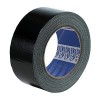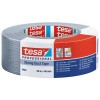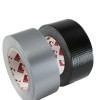Can duct tape withstand sea water? Let’s find out together
American duct tape is a tool that should never be missing from any toolbox.
And we don’t just mean the toolbox that you have at home: it should also be present in the emergency toolbox that you bring with you in your car, camper van, and boat, since cloth tape has the unbeatable advantage of being incredibly versatile in any context.
In many situations the presence of a roll of duct tape can make the difference, being a formidable emergency “patch”.
In the course of history, since its invention – in the middle of World War II – duct tape has been used in the most different contexts, from the set-up of helicopter blades to the servicing of a lunar rover’s fender.
It is, therefore, not surprising that many people, faced with these extreme uses, wonder if duct tape can withstand exposure to seawater, which is something which would cause issues for any kind of double-sided tape. So, is duct tape waterproof? And if so, to what degree?
Duct tape is waterproof
Yes, duct tape is waterproof. Looking at its structure, and simplifying a little, we could describe it as an adhesive tape mad up of three different components.
At the bottom there’s a layer of proper double-sided adhesive, where glue allowing the tape to adhere perfectly to the most diverse surfaces resides.
In between, there’s the component distinguishing American duct tape (so called because it was developed at the request of the US Army), i.e., the cloth.
The idea of making an adhesive tape of this type came from the observation of old duck tape, i.e., strips of non-adhesive cotton cloth that were used to reinforce pipes, shoes, and clothing.
The cloth inside duct tape gives it a great resistance power. The last layer is, finally, a protective layer which also happens to be waterproof. This last layer, in order to waterproof the whole roll, is generally made with polyethylene.
Therefore, it is fair to say that double-sided tape is waterproof. Be careful, however: even normal PVC adhesive tape, by itself, has a non-porous and absolutely waterproof surface. This doesn’t mean, however, that you should use this kind of strong double-sided tape to fix the hull of a boat!
It is paramount, then, to understand if the waterproof nature of duct tape is sufficient to make it withstand exposure to sea water.
Repairing boating and marine tools with duct tape
Why could be wondering if duct tape can withstand being exposed to seawater? Perhaps, on your last kayak trip, your paddle has been hit pretty hard, and you would like to repair it with tape.
Or maybe it’s not the paddle that needs fixing, but the kayak itself.
Well, in principle you could use American tape to reinforce a cracked paddle, but you should clean and completely dry the affected area before applying the tape, taking care to layer on the tape itself, forming a “ring” around the paddle blade.
This trick should help you extend the life of your paddle a bit. What about kayak repair? Well, we do not recommend using duct tape to repair something that needs to keep you afloat!
Be it an inflatable model or not, duct tape could not guarantee a good seal for the canoe, as it is not meant to be used that way. On the market there are special kits for boat repairs of this magnitude!
Duct tape: can it withstand exposure to sea water?
So, can duct tape withstand exposure to seawater? Yes, but up to a point. It can certainly be used to repair a paddle, to fix a flip-flop to be used on the beach, to fix a toy scoop and bucket, and even to repair the grip of a fishing rod.
This is because duct tape can easily withstand some sea water splashes, and even fast dunking. This does not mean, however, that duct tape is completely, 100%, waterproof.
If you were to apply a piece of cloth tape to the hull of a boat and then go out to sea, you would have no guarantee of finding that piece of industrial double-sided tape in place after a few hours or days of navigation.
Moreover, concepts such as waterproof and water resistant are always quite relative: for most fabrics and devices renowned for their water resistance, in fact, there always comes a moment beyond which water resistance is no longer guaranteed.







